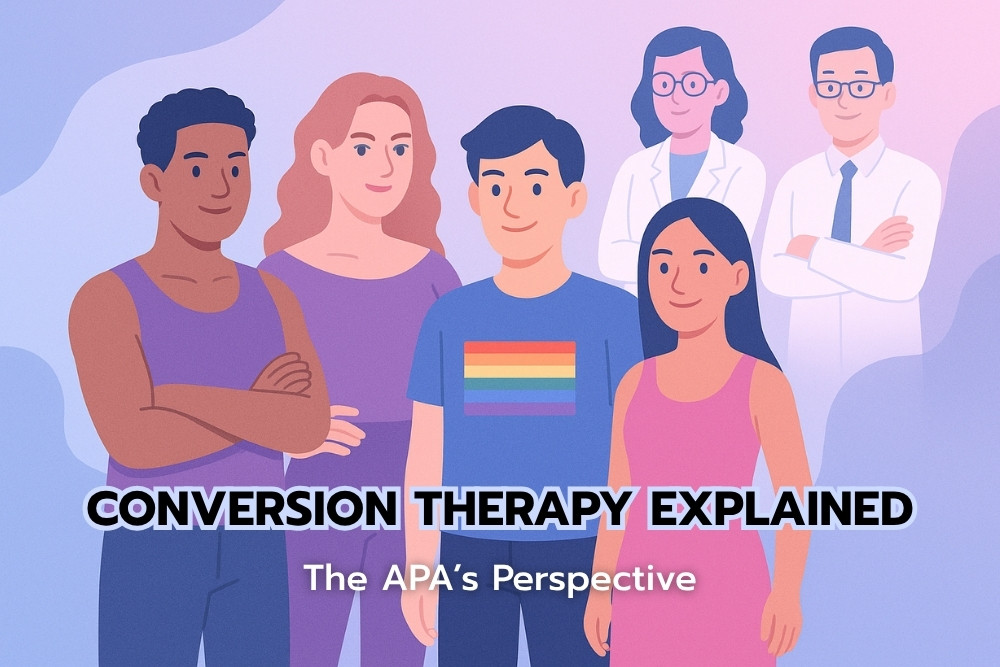In an era where the world is becoming more open and accepting of sexual diversity (LGBTQ+), there are still groups that attempt to “change” or “correct” individuals to conform to traditional gender expectations. This approach, known as Conversion Therapy, continues to exist in many parts of the world — including some areas of Thailand. However, from a medical and psychological standpoint, this practice lacks scientific evidence and often causes more harm than good to a person’s mental health. It is therefore no surprise that the American Psychiatric Association (APA) has firmly condemned this practice. This article explores what Conversion Therapy really is, why it is harmful, and why leading mental health organizations around the world strongly stand against it.
What Is Conversion Therapy?
Conversion Therapy refers to psychological or behavioral interventions aimed at changing a person’s sexual orientation or gender identity — from being part of the LGBTQ+ community (such as gay, lesbian, bisexual, or transgender individuals) to heterosexuality, in accordance with traditional social norms.
These practices vary widely, ranging from:

- Religious counseling
- Behavioral psychotherapy
- To, in extreme cases, the use of medication or even physical punishment
The primary goal of such methods is to “erase” or “suppress” one’s sexual feelings or identity. However, in reality, no scientific evidence supports the claim that conversion therapy can change a person’s sexual orientation. On the contrary, it often leads to severe emotional distress, guilt, and shame rooted in self-rejection.
The Origins of Conversion Therapy
The concept of conversion therapy dates back to the early 20th century, when Western societies still viewed “homosexuality” or “sexual diversity” as a mental or moral disorder. Some psychiatrists at that time believed that such therapies could “restore” individuals to what was considered “normal.” However, with the advancement of psychological and psychiatric research during the 1970s, the American Psychiatric Association (APA) officially removed “homosexuality” from its list of mental disorders in 1973. Since then, the global medical community has come to recognize that sexual diversity is not a disorder, but rather an integral part of human identity.
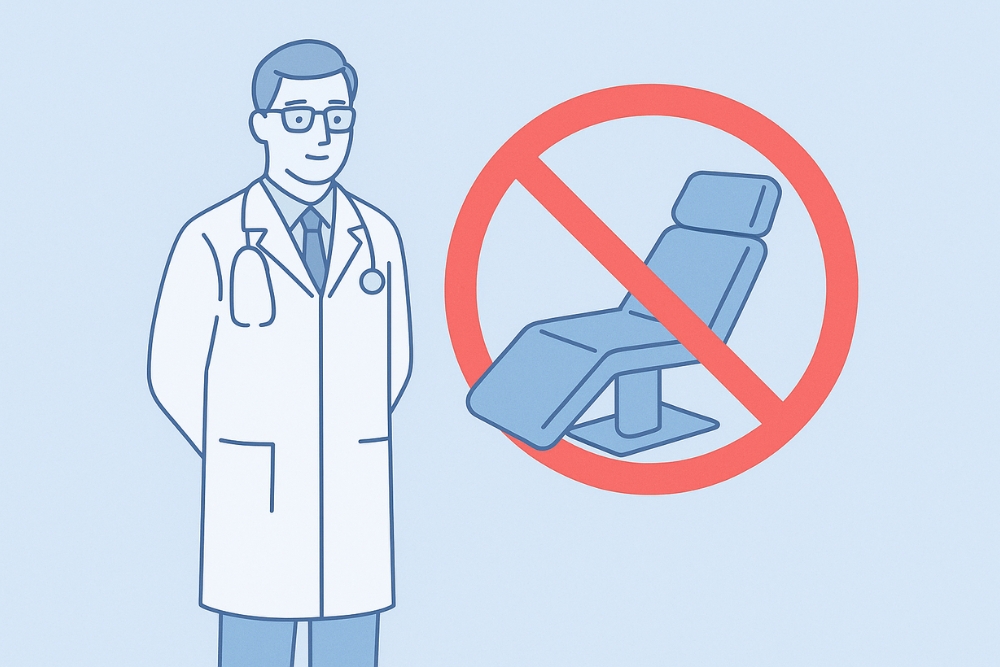
Why Did the APA Oppose Conversion Therapy?
The American Psychiatric Association (APA) — the world’s largest psychiatric organization — has issued an official statement declaring that:
“Conversion therapy is unethical and lacks any scientific evidence supporting its effectiveness in changing a person’s sexual orientation or gender identity.”
The APA emphasizes that such practices:
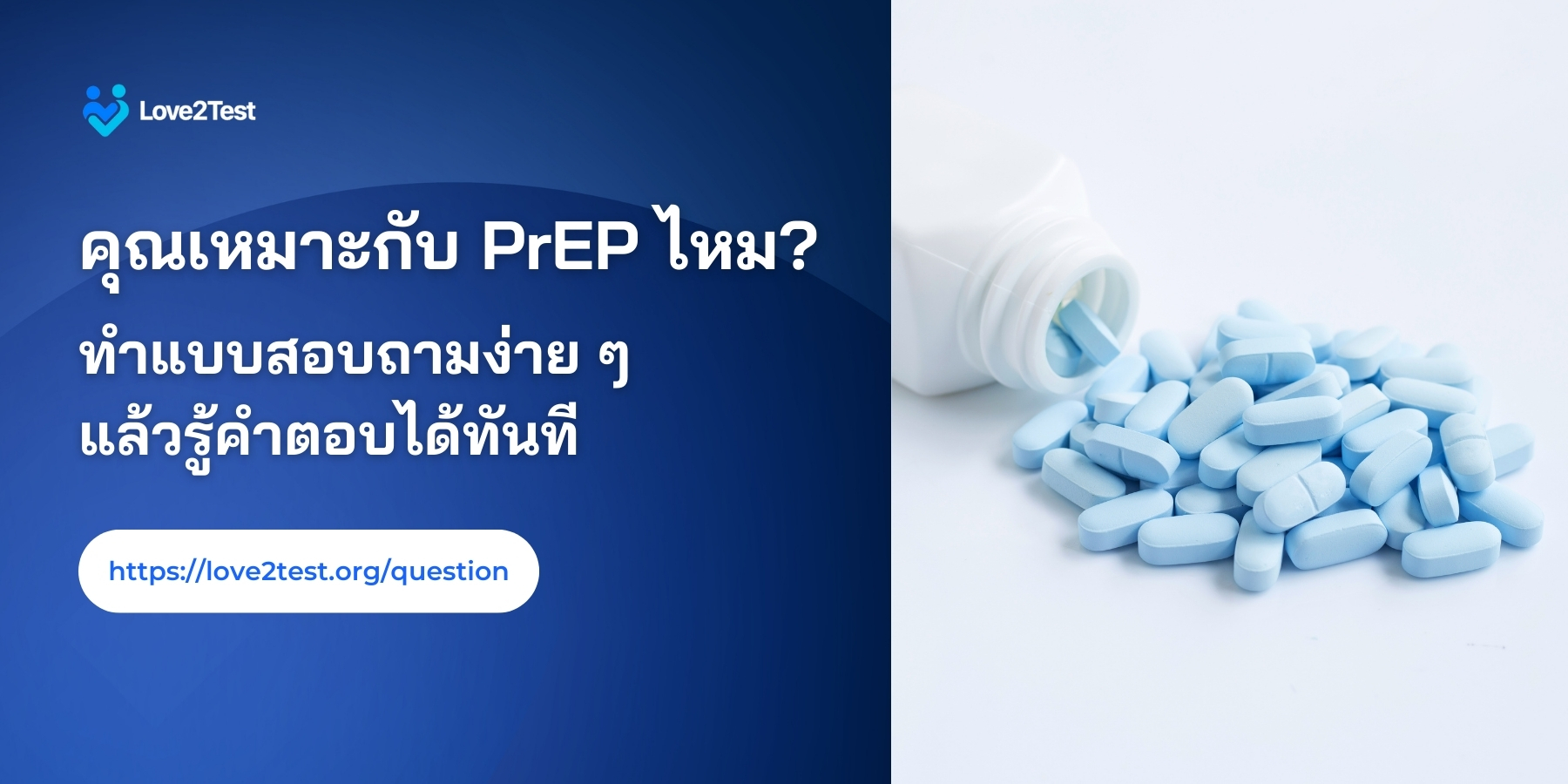
- Have negative impacts on mental health, including depression, feelings of worthlessness, and self-harm
- Violate fundamental human rights, denying individuals the freedom to express their true gender identity and sexual orientation
- Contradict core psychiatric ethics, which are founded on respect for human dignity and individual well-being
Consequently, the APA advises all mental-health professionals not to participate in or endorse any form of conversion therapy.
The Psychological Harm of Conversion Therapy
Research from multiple countries has shown that individuals who have undergone conversion therapy often experience long-term mental-health problems such as:
- Depression
- Anxiety
- Self-hatred or deep feelings of guilt
- And, in severe cases, suicidal thoughts or attempts
According to a 2023 report by The Trevor Project, LGBTQ+ youth who have undergone conversion therapy are two to three times more likely to attempt suicide compared to their peers. This demonstrates that any therapy built on self-denial not only fails to “cure” but in fact inflicts emotional harm on those struggling to accept who they are.
Global Movements Against Conversion Therapy
Over the past decade, many countries around the world have taken legal action to ban conversion therapy, particularly in cases involving minors:
- 🇨🇦 Canada – Officially banned all forms of conversion therapy in 2022
- 🇩🇪 Germany – Prohibits conversion therapy for anyone under 18
- 🇫🇷 France – Criminalizes both the practice and promotion of conversion therapy
- 🇬🇧 United Kingdom – In the process of enacting a permanent nationwide ban
- 🇹🇭 Thailand – Has not yet enacted a specific law, but civil-society groups and mental-health professionals are increasingly advocating against the practice
These movements mark a global shift toward recognizing that sexual diversity is not a disorder and that everyone deserves to live free from coercive and harmful “treatments.”
The Situation of Conversion Therapy in Thailand
Although Thailand is often perceived as one of the most open and accepting countries in Asia regarding sexual diversity, the concept of “conversion therapy in Thailand” still persists in certain areas — particularly within religious circles, conservative groups, and among some counselors who continue to view sexual diversity as something that must be “corrected” or “cured” to conform to social norms.
While Thailand’s Ministry of Public Health and the Department of Mental Health do not endorse or promote any form of conversion therapy, there is still no specific law that explicitly bans such practices, unlike in many Western countries. This legal gap allows some groups to continue conducting these activities without clear consequences. In recent years, Thai psychologists and human rights advocates have become increasingly active in calling for systemic change, urging the government to:
- Establish clear professional guidelines to protect LGBTQ+ individuals from conversion therapy
- Implement training programs for mental-health professionals to improve understanding of gender identity and sexual orientation
- Promote affirmative therapy, an approach that focuses on acceptance and self-understanding rather than attempting to change one’s identity
Legal and Policy Landscape in Thailand
Moreover, professional organizations in Thailand — such as the Psychiatric Association of Thailand and the Thai Clinical Psychologists Association — have begun issuing statements and ethical guidelines supporting the human rights of LGBTQ+ people. They stress that any attempt to alter a person’s sexual orientation or gender identity is inconsistent with psychological ethics and international standards.
Although Thailand has yet to enact an official ban on conversion therapy, several government bodies and human rights institutions — including the National Human Rights Commission (NHRC) and the Department of Mental Health — have publicly recognized that such practices are harmful and violate the right to self-identity.
At the community level, several civil society organizations, such as the Foundation for SOGI Rights and Justice (FOR-SOGI) and the Rainbow Sky Association of Thailand (RSAT), have organized public awareness campaigns to educate people about what conversion therapy is and why it is dangerous, while providing mental-health support for those who have endured such experiences.
Building safe psychological spaces in Thailand is therefore an essential step — one that must go hand in hand with clear public policies — to permanently end conversion therapy and establish a mental-health system that truly embraces sexual diversity and human dignity.
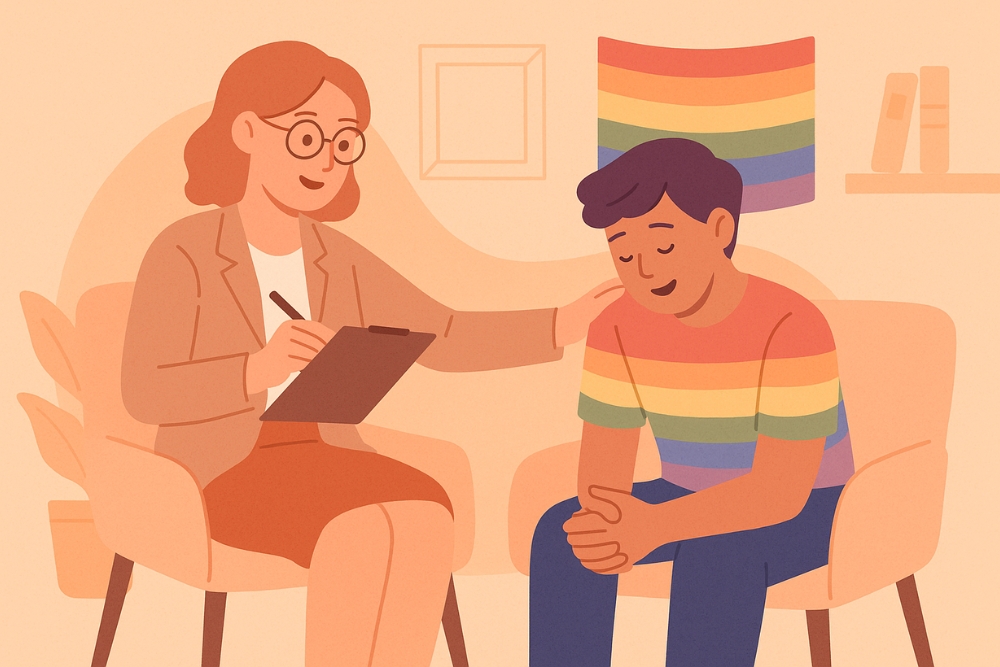
Compassionate Mental Health Care Instead of Conversion Therapy
Rather than trying to “change” someone into something they are not, mental health care should focus on understanding, acceptance, and support, allowing individuals to live authentically and safely.
Effective and ethical approaches include:
- Affirmative Therapy – providing supportive counseling that helps individuals understand and embrace their identities without judgment.
- Creating safe spaces for LGBTQ+ individuals to express themselves freely.
- Training healthcare professionals to develop awareness and sensitivity regarding gender identity and sexual orientation.
When people feel genuinely accepted for who they are, they are more likely to live happier, healthier, and emotionally resilient lives.
Related Article
- Equal Health Access – Hormone Therapy Under Gold Card
- IDAHOBIT 2025 – The Power of LGBTQ+ Communities in Thailand
The APA’s Message That Echoes Worldwide
The statement issued by the American Psychiatric Association (APA) is not merely a professional position — it represents a commitment to human rights and human dignity.
It sends a powerful message to the world:
“No one should ever be forced to change who they are.
Being yourself is not a mistake.”
This marks an important step forward in global understanding — recognizing that mental health and sexual diversity are inseparable, and that both deserve equal respect, empathy, and protection.
FAQ
☞ If you or someone you know is being forced to undergo conversion therapy, you can file a complaint with the National Human Rights Commission of Thailand (NHRC) or seek support from licensed psychologists or LGBTQ+ rights organizations to receive safe and appropriate assistance.
☞ Affirmative Therapy focuses on affirming one’s identity rather than trying to change it. Mental health professionals help individuals understand, accept, and live according to their own gender identity and sexual orientation with confidence and improved mental well-being — unlike conversion therapy, which seeks to erase one’s true self.
☞ Many people still believe that conversion therapy works because of cultural or religious beliefs that view sexual diversity as something abnormal. In some cases, unqualified counselors or groups may falsely claim success, leading to misconceptions — even though no scientific evidence has ever supported the effectiveness of conversion therapy.
☞ The best way is through listening and acceptance, not trying to change them. Family support plays a crucial role in the mental health of LGBTQ+ youth. Parents can engage in open conversations, learn more about sexual diversity, or consult with psychologists who practice Affirmative Therapy to better understand and support their children.
☞ Many new-generation Thai psychologists are now adopting Affirmative Therapy. Which emphasizes understanding and supporting individuals as they are, rather than changing who they are. Meanwhile, organizations such as the Thai Clinical Psychologists Association. The Department of Mental Health have also begun to prioritize LGBTQ+ mental health and advocate for inclusive psychological care.
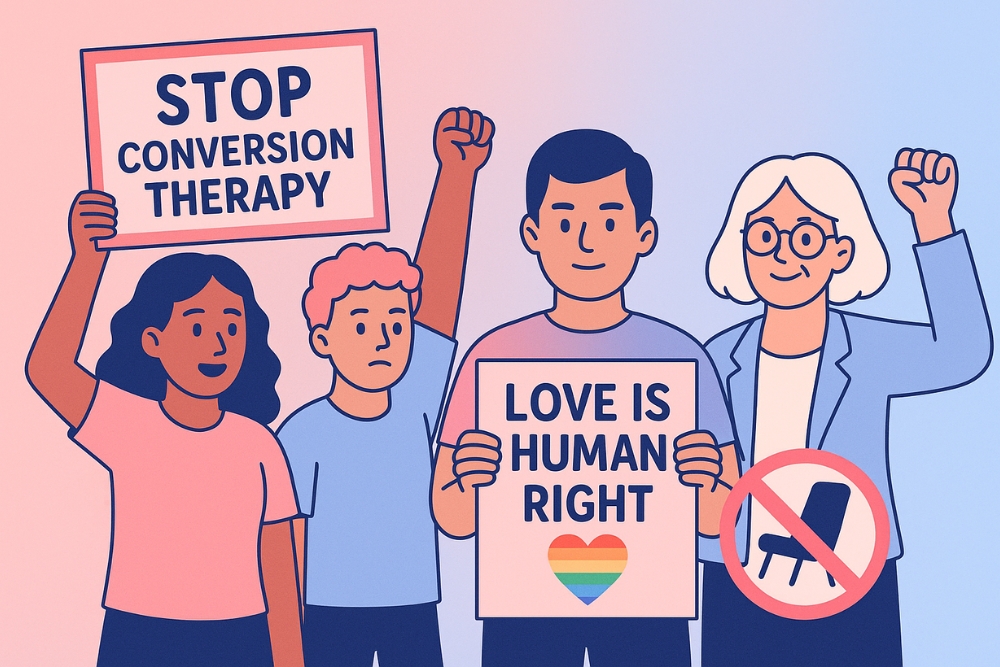
Conclusion
“Conversion therapy” may be described as a form of “treatment,” but in reality. It is an act that destroys a person’s confidence and human dignity. The American Psychiatric Association (APA) and mental health organizations around the world share the same conviction that:
- Sexual diversity is not a disease.
- Conversion therapy is ineffective and unethical.
- What society should promote instead is acceptance, understanding, and compassionate care.
Ending reparative therapy is not just about stopping a harmful practice. It is about beginning a new chapter for a more equal, safe, and respectful society. One that values every person’s right to live authentically and with dignity.
Reference:
APA Position Statement on Conversion Therapy and LGBTQ+ Patients
การใช้ฮอร์โมนเพื่อการข้ามเพศ แนวทางและความสำคัญ
การสนับสนุนสุขภาพจิตในชุมชน LGBTQ+
